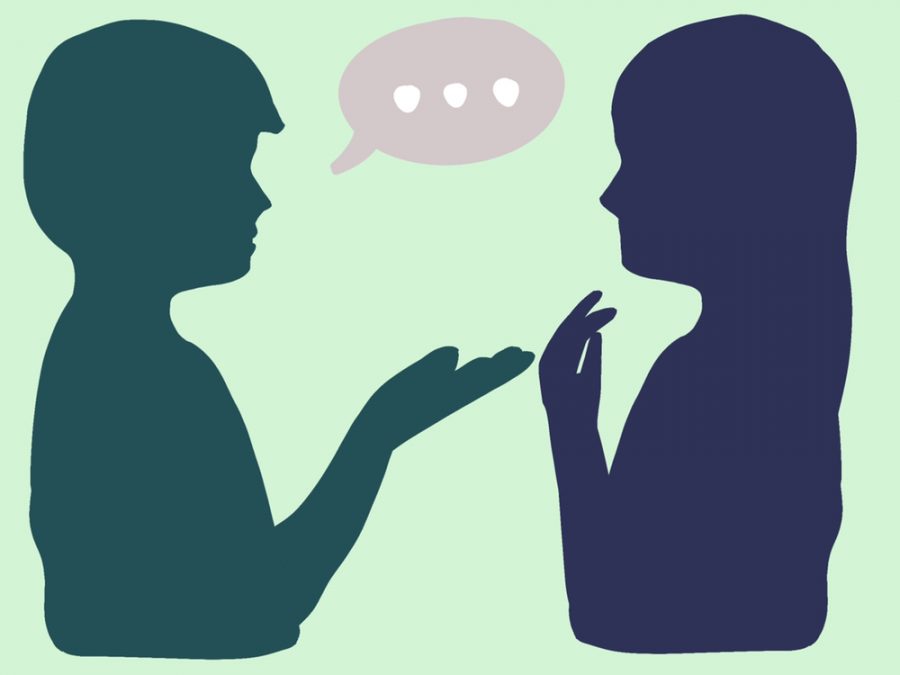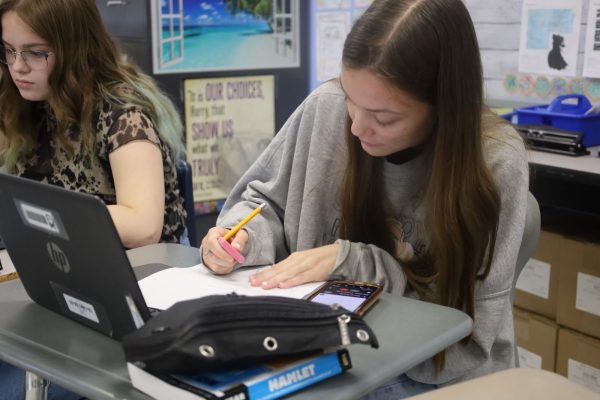Small Talk: Big Deal
While some students find conversation easy, others struggle to maintain a steady dialogue.
photo by Alexis Madlang
Though different students seem to have different opinions on small talk, everyone seems to agree the best way to go about it is talking about easy things both you and the other person have in common.
Two new partners sit next to each other in Physics. Having never spoken before, they sit in uncomfortable silence before one of them decides to break it.
“… Nice weather we’re having.”
The dreaded small talk. For some, small talk is as easy as breathing, but for others, it is a genuine challenge.
Junior Kayla Collins, however, does not seem to have any problems. As a theater student, Collins is confident she has mastered bold conversation and confidence while surrounded by a large cast and crew, which has taught her to communicate without being awkward.
“You can take the time to know people,” Collins said. “Sometimes it’s more beneficial to know who you’re talking to at least a little.”
Compared to Collins, freshman Elise Nash considers herself slightly more introverted. She admits she is not very good at making small talk with people she does not know but uses it anyway as a method of making new friends.
“Opening up a conversation with any open-ended questions or topics is great to continue the conversation and make a new friend,” Nash said. “Ask what their interests are. A college they’d want to attend or career is a good way to start small talk. In some cases, asking why they’re attending an event is a good way to start a conversation as well.”
Junior Aidan Donaghy, meanwhile, has a slightly more difficult time. A quiet student, Donaghy struggles to communicate with people he does not know well.
“I think the hardest part is finding something to talk about,” Donaghy said. “Without finding it, there is awkward silence or boring questions that make the other person uninterested. [It’s about] asking the right questions.”
For some, small talk can be even more difficult than just not being sure what to talk about. It can be hard to strike up a conversation with a stranger, especially for senior Erika Keast, who finds these conversations uncomfortable and difficult to manage, especially when they are not sure how to keep a very general conversation going.
“Silence is awkward but sometimes I don’t really know how to approach a person because I don’t know them,” Keast said. “It feels rude to pry into the other person’s life because you haven’t established how much you’re allowed to pry yet.”
For Keast, small talk did not even help them make most of their friends.
“I made most of the friends I have today because they started talking about something weirdly specific that I could add onto through my own personal experience, and so the conversation didn’t feel awkward or come to an abrupt end,” Keast said. “An example is shared childhood experiences… because that can branch off anywhere after that.”
Though being introverted is certainly a big obstacle, mental health is an even greater one that can be incredibly difficult to overcome. With small talk, anxiety can make it significantly harder to approach someone or maintain a conversation.
Junior Emily Cobb does not always struggle to carry a conversation, but she does have a hard time beginning them. Cobb experiences anxiety, which she continues to address in order to help her overcome her fear of social interaction.
“Once I get myself over blocks, I do just fine, so I guess the key is to not have those blocks and go into intimidating situations like there’s nothing intimidating going on,” Cobb said.
During her freshman year, Cobb’s anxiety would ruin her pacing, and make her so nervous she would start to giggle or ramble on during class presentations.
“Mrs. Love asked me what my favorite month was, and I said ‘well, January is my favorite month, because it’s my birthday month and I got hit by a car, but, in eighth grade, my friends threw a really nice party,’ and just glossed over it,” Cobb said. “I was so stressed out by the fact that I had just dropped that in and moved on because I had no idea how to pace what I was saying, I never fully got to express myself. Having to get up there and say it on the spot… my anxiety took over the words that I was saying.”
Despite the challenge, Cobb does not let her anxiety get the best of her- she uses classes like band and debate to improve her speaking skills.
“They help me get over myself, especially in debate, by just jumping in headfirst and forcing myself to get better at small talk,” Cobb said. “Having classes or extracurriculars in common with people also give me something in common to talk about.”
According to the Child Mind Institute (2015), one in three students, like Cobb, have anxiety. Meanwhile, a smaller number of youth suffer from social anxiety. Though it is different for everyone, these students may get flustered easily or forget what they were going to say. People who suffer from social anxiety are afraid of what people will think of them and small talk only makes matters worse because they feel they have no time to prepare themselves.
Senior Roshna Cherugail is aware of how uncomfortable some people can be. An extrovert by nature, she goes out of her way to try to make her peers feel secure during conversation.
“I try to match the other person’s energy, try to gauge their kind of personality, and once I find that out I try to reflect them,” Cherugail said. “If they’re more the quiet type, I tone down my personality so they don’t get uncomfortable, and through conversation if I find they’re a little crazy, too, I’ll tone up my energy to match them.”
Small talk has helped Cherugail make many of the friends she has today. When she first moved across the country from New Jersey to Florida, it was an essential asset in her skill set.
“It wasn’t like I had any previous friendships to base myself off of, so my friendships are mostly created by first initiating small talk,” Cherugail said. “I’m not the kind of person that waits for it to happen.”
While chit-chat can be incredibly irritating for some and a fun time killer for others, it has clearly become an integral part of daily socialization. For better or for worse, it is a big deal.
“Most friendships that are present now do start with small talk,” Cherugail said. “Because obviously in order to get close to someone you’ve got to first kind of see if you can mix well with them.”
Your donation will support the student journalists of Hagerty High School. We are an ad-free publication, and your contribution helps us publish six issues of the BluePrint and cover our annual website hosting costs. Thank you so much!








